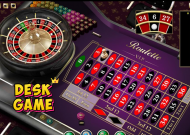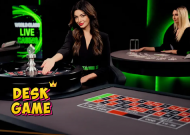evolution auto roulette prediction
- Casino Blog
- 2024-12-21
- 6
- Time:2024-12-21 08:21:32
FB777 Slot Machine | FB777 Free Credit | FB777 JILI Legit Slot Website News: The Evolution of Auto Roulette Prediction: From Chance to Scientific Mastery
The game of roulette has long been a cornerstone in casino s worldwide, enchanting players with its unique blend of chance, strategic thinking, and the tantalizing prospect of substantial winnings. Traditionally, roulette has been perceived as a game of pure luck, where each spin's outcome is entirely random. However, the advent of advanced technology and the development of sophisticated predictive algorithms have significantly altered our approach to this classic game. This article delves into the intriguing journey of auto roulette prediction, tracing its evolution from a game of chance to a domain where science and mathematics play pivotal roles.
The Origins of Roulette
Roulette, derived from the French term "little wheel," originated in the 17th century and has since become one of the most iconic and enduring casino games. The game's apparent simplicity—where players bet on the final resting place of a ball on a spinning wheel—masks a rich and fascinating history. Initially, roulette was purely a game of chance, devoid of any methods or tools for predicting outcomes. The inherent randomness of each spin was a core element of the game's allure, making it accessible to players of varying skill levels.
The FB777 JILI Free Slot | FB777 JILI Free 100 | Welcome Bonus Website: of Auto Roulette
With the proliferation of online casinos and significant technological advancements, auto roulette emerged as a popular variant of the traditional game. Auto roulette employs an automated wheel and ball launcher, eliminating the need for a human dealer. This innovation not only accelerated the pace of gameplay but also introduced a new level of consistency and precision. The automated nature of auto roulette paved the way for the possibility of predicting outcomes, as the mechanical aspects of the game became more predictable and less subject to human error.
Early Attempts at Prediction
The earliest efforts to predict roulette outcomes were largely rooted in superstition and intuition. Players would scrutinize patterns in the numbers that had previously appeared, believing that certain numbers were "due" to come up. While these methods were inherently ineffective, they underscored the human inclination to find order within randomness.
As technology progressed, more refined approaches began to surface. One of the earliest scientific endeavors to predict roulette outcomes involved the use of "roulette tracking" systems. These systems entailed recording the outcomes of numerous spins to detect any biases in the wheel or ball. Although this method yielded some success, it necessitated extensive data collection and analysis, rendering it impractical for the average player.
The Rise of Predictive Algorithms
The true breakthrough in auto roulette prediction came with the advent of predictive algorithms. These algorithms leverage complex mathematical models to analyze data from previous spins and forecast the likely outcomes of future spins. The cornerstone of these algorithms is their capacity to process vast amounts of data swiftly and accurately, identifying patterns and trends that would be imperceptible to human observation.
One of the most renowned examples of a predictive algorithm in roulette is the "Eudaemonic Pie" system, developed by a group of physicists in the 1970s. This system integrated computer analysis with wearable technology to predict roulette outcomes. Although not infallible, it showcased the potential of leveraging technology to gain a competitive edge in the game.
Machine Learning and AI
In recent years, the realm of auto roulette prediction has been further transformed by the integration of machine learning and artificial intelligence (AI). These cutting-edge technologies can learn from data and refine their predictions over time, making them exceptionally powerful tools for analyzing roulette outcomes.
Machine learning algorithms can be trained on extensive datasets of roulette spins, enabling them to discern subtle patterns and correlations that would elude traditional methods. AI systems can also adapt to changes in the game, such as variations in wheel speed or ball trajectory, ensuring the ongoing accuracy of their predictions.
A notable example of AI in roulette prediction is the application of neural networks. These networks emulate the structure of the human brain, allowing them to process complex data and make nuanced predictions. By training these networks on historical roulette data, researchers have developed models capable of predicting outcomes with a high degree of precision.
Ethical and Legal Considerations
The evolution of auto roulette prediction raises significant ethical and legal issues. While predictive algorithms and AI can confer a substantial advantage to players, they also prompt concerns about fairness and the integrity of the game. Casinos enforce strict rules against the use of any devices or methods that can influence game outcomes, and the deployment of predictive technology is often deemed a form of cheating.
From a legal standpoint, the use of predictive algorithms in roulette occupies a gray area. Although there are no specific laws prohibiting these technologies, casinos retain the right to ban players suspected of using unfair methods. Moreover, the use of wearable technology or other devices to aid prediction can be deemed illegal in certain jurisdictions.
The Future of FB777 JILI Free Slot & Color Game game play: of Auto Roulette Prediction
Despite the challenges and controversies, the field of auto roulette prediction continues to advance. Ongoing technological progress, particularly in AI and machine learning, is poised to yield even more sophisticated prediction methods.
One potential development is the integration of predictive algorithms into online roulette platforms. By analyzing data in real-time, these platforms could offer players personalized betting strategies based on their playing history and observed patterns in the game. This could enhance player engagement and interactivity while preserving the game's integrity.
Another promising avenue is the application of virtual reality (VR) and augmented reality (AR) in roulette prediction. These technologies could provide players with immersive environments where they can visualize data and predictions in real-time, deepening their understanding of the game and improving their chances of success.
The transformation of auto roulette prediction from a game of chance to a discipline driven by science and technology is a testament to human ingenuity and our unyielding quest for understanding. While the use of predictive algorithms and AI in roulette remains contentious, it has undeniably revolutionized our approach to this classic game.
As technology continues to advance, the potential for auto roulette prediction is boundless. Whether through more advanced algorithms, integrated online platforms, or immersive VR experiences, the future of roulette is likely to be shaped by our ongoing efforts to predict the unpredictable. Ultimately, while chance will always be an inherent aspect of roulette, the science of prediction adds a new dimension of excitement and challenge to this timeless game.
Previous page:how does auto roulette work
Next page:idle dice auto roulette prestige






